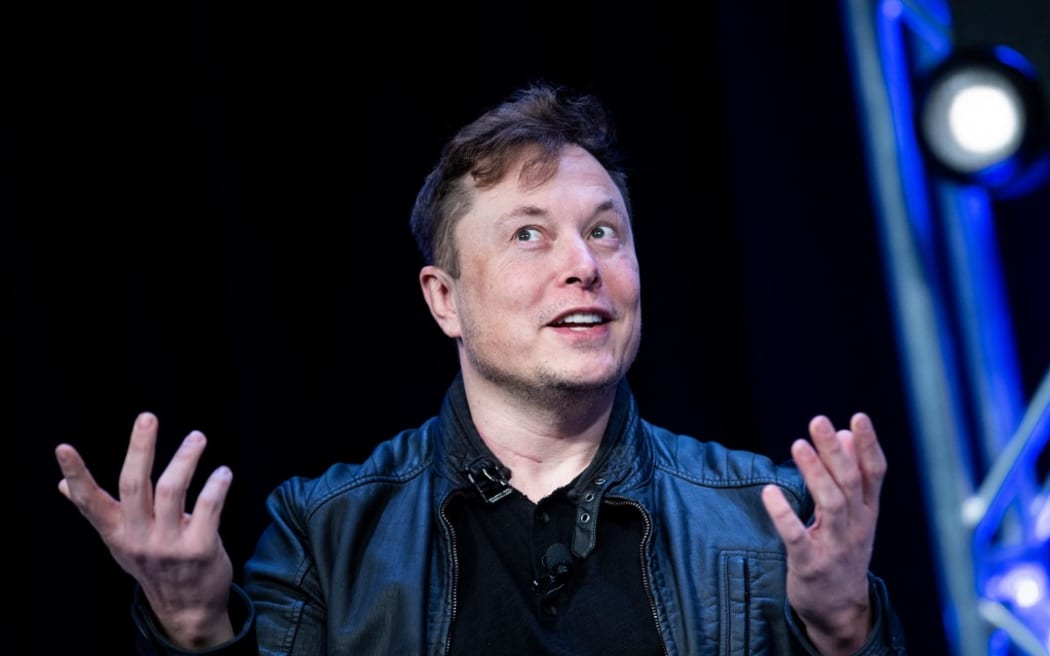
Tesla chief executive Elon Musk. Photo: AFP
For years, Silicon Valley's stars have been able to drum up positive media headlines with their visions of a future tech utopia. In 2022, several of them ran into the hard wall of reality.
"Make some noise for the richest man in the world," said the stand-up comedian Dave Chapelle, as he welcomed Elon Musk on stage.
The crowd certainly made some noise, though it wasn't what Chapelle was expecting. Boos and jeers rang out between more sparse claps and whoops, with the jeering chorus going on for nearly 10 minutes.
The billionaire Tesla chief executive might have expected a more rapturous welcome in the global tech hub of San Francisco.
But his image has been tarnished after a tumultuous first few months as the owner of the social media platform Twitter, during which he botched the rollout of a new paid-for account verification system, laid off thousands of employees in questionably legal fashion, and generally alienated a lot of people by using his account to engage in near constant right-wing trolling.
He was not the only billionaire tech titan to suffer a precipitous fall from grace in 2022. It was a year where many of Silicon Valley’s more lofty promises ran into the hard wall of reality.
Mark Zuckerberg has endured a deluge of bad headlines and a sharp dip in Meta’s stock price after sinking $36 billion into a virtual reality ‘Metaverse’ that even his own employees do not use.
Sam Bankman-Fried, the so-called “good guy” of crypto, was arrested earlier this week in the Bahamas over alleged fraud he committed in the lead-up to the collapse of his company FTX.
Elizabeth Holmes, founder of the bogus medical tech startup Theranos was jailed for 11 years for fraud last month.
The list goes on.
This media negativity might be coming as something of a shock to Silicon Valley’s stars.
Though the amount of sceptical coverage they have received has risen over the years, many of them have enjoyed a mostly easy ride from the press and government regulators.
Before its collapse, FTX was able to run ads on US national TV during the Super Bowl without so much as a warning.
Bankman-Fried was able to generate fawning media profiles for his supposed commitment to a philosophy known as effective altruism, and his apparently more sensible approach to marketing cryptocurrency.
On Thursday, The New York Post printed his face on its front page alongside the headline 'Hairy Plotter'.
Crypto, at the very least, has had a harder time from the press than some tech companies – most notably those promising transport revolutions.
In 2016, Volvo NZ’s Coby Duggan told RNZ that fully autonomous self-driving cars would be on the roads by 2020 or 2021.
"That does sound amazing," the host replied. "It’s so soon."
If it sounded amazing, it was possibly because the idea people would be replying to emails and applying their makeup in fully autonomous vehicles by now was, to put it mildly, overly ambitious.
But Volvo and RNZ were hardly outliers in taking a sunny view on driverless technology back then.
The New Zealand Herald also reported in 2016 that self-driving cars could be on the road by the end of that year.
Opinion writer Paul Minett urged the government to delay every road and public transport investment wherever possible in anticipation of the driverless revolution.
Another Herald columnist, Matt Heath, said Auckland’s City Rail Link would likely be obsolete by the time it opens because by then “computer co-ordinated driverless pods” would “rule the city”.
Six years have come and gone and – pandemic delays aside – there was no sign of self-driving cars on our roads.
In fact, they look further away than ever.
Ford and Volkswagen shut down their jointly funded autonomous vehicle startup Argo AI in October, saying the technology was still a long way from being brought to market.
Other flawed transit-focused tech companies have been boosted by sympathetic or insufficiently critical media coverage including Uber, which once said it would ease congestion in cities. In fact the opposite has proved true.
But no one has benefited more than Musk.
His company Tesla got a rush of good press when it joined the push for driverless vehicles. It was now arguing in court that its experiment should only be labelled a failure rather than a fraud.
Musk also promised to fix what he called “soul-destroying traffic” by building a network of tunnels underneath and between cities through his startup The Boring Company.
Transport experts dismissed the idea as a farcical distraction, but several cities cancelled their own transit plans and invested in the company and his vision - only to see it cease all communications after running into minor regulatory obstacles or minor cost overruns according to reporting from The Wall Street Journal.
On an episode of the Vox podcast Today, Explained Alissa Walker from the New York website Curbed said The Boring Company saga mirrors an episode of The Simpsons in which a salesman convinces the town of Springfield to fund a shoddy monorail that promptly breaks down.
And Musk’s startup Neuralink, which aims to blend brains and computers, was under federal investigation after killing 1500 animals in experiments.
Musk has got away with peddling exaggerations, half-truths and no-truths partly because of his audacity and undiluted self-belief.
Social media has expanded the reach of these kinds of confidence men, allowing them to build cult-like followings without having to win over so much as a slightly sceptical newspaper editor.
But figures like him have also gained support from gullible or 'access-driven' parts of the press, which have uncritically amplified their utopian promises and self-aggrandising mythologies.
As late as this April, respected tech journalist Kara Swisher was warning people not to underestimate Musk or his Twitter takeover.
She told New York Magazine he was a “visionary” - but later told Musk in a tweet he was her "greatest disappointment in 25 years of covering tech".
"Well, you and having to interview Jeff Bezos on a Segway once," she added.
It may have taken a semi-disastrous dip into social media to dim Musk's lustre for some, but a few journalists and commentators have always been distrustful of big tech’s big promises.
One of them was Paris Marx, author of Road To Nowhere: What Silicon Valley Gets Wrong About Transport.
They spoke to Mediawatch back in October, before the worst of Musk’s Twitter drama, about the importance of applying a sceptical eye to any tech billionaire promising transport utopia.
"I think we have seen a bit more scepticism in recent years, especially since 2018 when the Cambridge Analytica revelations came out around Facebook," Paris Marx told Mediawatch.
"For a long time there was a real desire to buy into what these Silicon Valley tech companies were promising us. Now ... it's really incumbent on us to keep asking those questions as companies keep making big, outlandish promises."
Despite that increased scepticism, Marx said reporters still buy into tech's narratives on topics like the transformative potential of electric cars.
Several commentators in New Zealand have pointed to the electrification of the vehicle fleet as the sole step needed to decarbonise the transport system.
Marx disagrees with that assessment, given the deaths and injuries caused by cars, the geometric problems they pose for city design as well as the cost of keeping one.
"I would argue the more sustainable path is to try to incentivise and try to build our communities in such a way that as many people as possible have alternatives to driving a car.
"Do we continue on this road where we're dependent on cars - or do we offer people real alternatives?"
Marx recognises the economic constraints on the media, which can make it easier for tech companies' PR departments to get their message out unfiltered.
But if they had their way, journalists covering tech companies, particularly those selling transport solutions, would always seek out critical voices before hitting publish.
They said we owe it to those who cannot drive, including the vision impaired or a large number of elderly people, to not just swallow the narratives coming from companies like Uber.
"I would want to see a greater focus on the way that people get around, the issues that people have getting around the city, the people who can't easily use the system that we have to day," they said.
"What are the interventions that we can make that will solve the actual problems people face in getting around, and often it's not the types of things that the tech companies are proposing."


